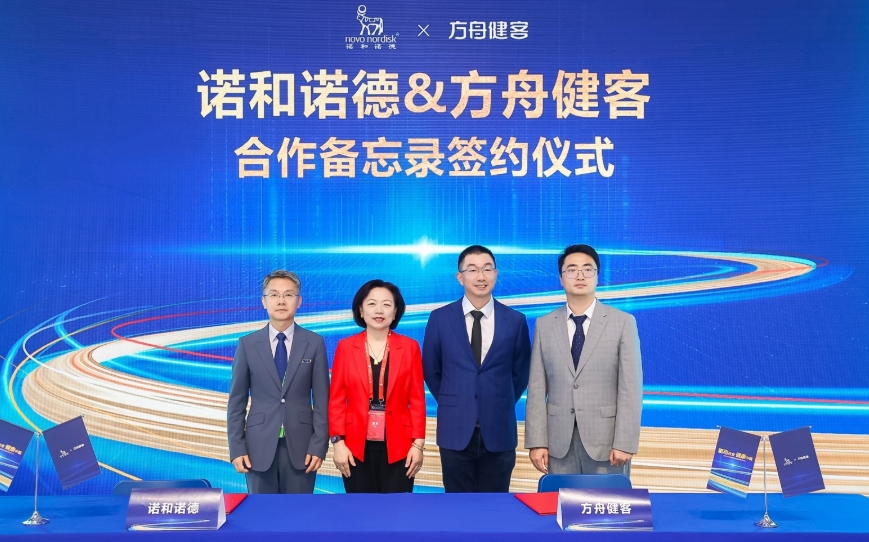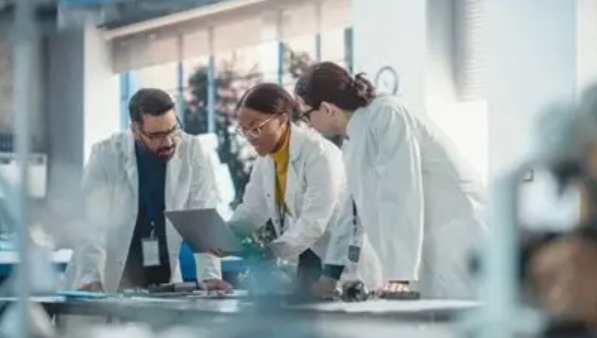
As part of our Discovery Makers series, Conor and Dodi discuss why Sebastian went into his research field, what motivates him, why he enjoys teaching, and what future research Sebastian is looking into.
CONOR: Dodi, today we're going back to our miniseries Discovery Makers.
DODI: Oh, I love these! These are where we learn about scientists who are making incredible progress in their field. And there are so many different fields and there are so many different personalities. Who are we going to meet today?
CONOR: Yes, today we are going to be hearing from Sebastian Falk.
SEBASTIAN FALK : I mean, the major goal for us is to make discoveries. We have competitors all over the world who are interested in making discoveries.
DODI: Oh, discovery talk straight away! He's right up our alley, isn't he?
CONOR: He absolutely is. You see, Sebastian loves scientific discovery. I mean, he just loves, loves, loves discoveries.
SEBASTIAN FALK : I mean, making discoveries is I think one of the most exciting things that you can imagine. For example, when you determine the protein structure, and you’re sitting in front of your computer screen, and you're the first person to see this it's simply amazing. You're sitting there, and you spend years and years to get to this point, and finally you have achieved it. And then of course, this is the moment where you run around the lab, you say, "Everybody come to my office, I have to show you something. Look at this! Look how it looks. It's amazing! We can see how this thing works now." And this is where your heart goes up and down and you actually don't know what to do, because you're simply too excited. Unfortunately, these moments are quite rare.
CONOR: See what I mean?
DODI: Pure excitement, I do! Did Sebastian mention proteins back there? So, that seems to be what matters on today's episode of Discovery Matters.
CONOR: Oh, yeah, its proteins, and tennis, and art, and curiosity, and all sorts of things.
DODI: Those things go together quite naturally.
CONOR: Of course, why not? Sebastian Falk is a group leader at the University of Vienna.
SEBASTIAN FALK : I'm a biochemist and structural biologist by training. I'm leading a small research group where we are investigating the structure and function of proteins and protein machines, and how they work in RNA metabolism. And at the same time, I'm also of course teaching here at the university where we educate the next generation of up-and-coming scientists.
CONOR: And it's safe to say, Sebastian really likes asking questions.
SEBASTIAN FALK : Where did we come from and where are we now? What could this mean? Could this mean this? Is there something we can connect it to? What are the essentials? Thinking, while running or swimming, what is this? What can I do? And maybe what are these different parts for?
DODI: I'm not being ageist here, Conor, but Sebastian sounds young.
CONOR: Yes, Sebastian's achievements make you look like you've really achieved nothing in your life so far. He's very young, like young, young, even though I try not to think about age. That's one of the really nice things about being in this job is that we're constantly exposed to younger people that just come out of high school and university and are full of energy and the promise of the world. And you think that that keeps us younger?
DODI: For sure!
SEBASTIAN FALK : No, I never think about age! I think that's one of the really nice things being in this profession that you're constantly exposed to work with young people who have just come out of high school and are very energetic. And by this, I think we age slower than other people because we are constantly in contact with young people. And that is very exciting.
DODI: What was Sebastian's path in becoming a scientist?
CONOR: Well, Sebastian says it was just a case of coincidence and serendipity.
DODI: Another of our favorite themes on this podcast.
SEBASTIAN FALK : I had never had a long-term plan to become a scientist. I finished high school, and during high school I really didn't know exactly what I wanted to do. I was also not always the best pupil, but I have always been very good in natural science: chemistry, biology, and mathematics. And that was very easy for me to take. So, I never felt that this is something I have to learn or force to engage with. Biology and chemistry are interesting so then I just decided to do biochemistry, which is the merger between the two. And even when I entered university, I did not know what I was going to do.
CONOR: Sebastian got his first internship and he suddenly found himself in a lab wearing a lab coat.
SEBASTIAN FALK : I have to say this was the moment where I realized I can start to think about problems, how to approach them, I can sit down and use the literature to think about what to do. And this felt like real freedom, because this means you can try to answer a question with various ways, and you decide to pick one. And this is what I have to say is for me, what I think makes this job so highly interesting is that I can basically - most of the time - decide what I want to do and how I do it. And this is fantastic.
CONOR: And so, Sebastian started asking his own questions...
SEBASTIAN FALK : As scientists, we are free to ask the question that we want. And I think that's important to me, because very often when we start a project, we have a particular question in mind that we want to answer, but then we make a discovery that is sometimes really unexpected. And from this moment on, then we say, "Okay, we don't know what that means." But then it's up to us to decide, is this a route that we want to follow? Does it make sense for us? Is this in our expertise? Or should we follow the path that we are more experts in. Together with my team, we can decide which routes to follow on, and this is one of the key things that makes me like this job so much.
CONOR: So, straight from the off, he's rolled up his sleeves, he's started asking all sorts of questions, he's experimenting to get the answers, he's embraced the idea of the scientific method of trial and error and moving forward through making mistakes.
SEBASTIAN FALK : I think it's pretty helpful if the first project that you do are not working perfectly and smoothly, because otherwise you get the impression that science is just a smooth project. You know, you design your experiment, you have a hypothesis, you execute them, you get the results, and then you have your answer. But I think it's also for growing as a person, and how to deal with project failure which is important. Science without failure simply doesn't work! When you're constantly exposed to failure, but having the freedom deciding on what to do, I think is balancing this out a lot.
DODI: So, how does that work for him then? It's the traditional scientific method, but he's also young, and he's experimenting and he's pushing the science forward.
CONOR: Yes. Well, he talks about when he was sitting in a lecture and listening to one of his favorite professors.
ARCHIVE LECTURE: "Perspective studies, using positive medicines..."
SEBASTIAN FALK : He was saying that his research is focused on how do proteins fold. So, how does a protein that is a linear spaghetti come into the fine three-dimensional structure? And when he just phrased this question, I was thinking, "How on earth can they follow this process?" Because I could not imagine how they studied this.
CONOR: And then with the swipe of a hand and a PowerPoint side, and as if by magic, the professor presents all the research and the methods that he'd been using to answer this question.
SEBASTIAN FALK: This is why I said, "Okay, this is really cool. I really want to do these things as well." This is how I got hooked with protein science.
CONOR: So, Sebastian at this point, is all in. It was proteins, and proteins, and proteins. So, for years of experimenting, asking questions about how a protein can be made in one place and targeted to another place in order to end up making the right thing happen in a cell or in the body. He gets his PhD, and he's never looked back.
DODI: So, are his questions changing? What is Sebastian asking today?
CONOR: Well, today he's looking into gene silencing in a process called RNA interference or RNAi.
DODI: Okay, so RNA is flavor of the day, a super sexy topic in science. What is he focusing on when it comes to RNA interference?
CONOR: So, Sebastian's really interested in the kind of the inner workings of nucleic acids like RNA and how they perform their jobs in the cell, but he does that by kind of taking it all apart. And looking at it in vitro. Let's hear from him...
SEBASTIAN FALK: What we do is we take individual proteins, individual molecules, out of the cellular context, and put them together and then try to understand what the function of each component is. This is like disassembling a car because there's so many pieces. You take it apart, and then by putting together the pieces, you get the engine to work. Then, you know, this is something that constitutes an engine and that's how you learn how engine works. And this is one of these moments where my excitement goes up. If you see that this combination of molecules allows this reaction to happen, it means you have found the core of this machine, which makes this work. And in my group, we are interested in following up of a particular process, where we are interested in understanding how the nucleic acid molecules - that are made in the nucleus of the cell - how they are basically degraded or manipulated by proteins in the nucleus. And this is what we are focusing on. So, we are interested in nucleic acid metabolism, but we are looking at it from the protein side. So, how proteins interact with nucleic acids to get them into shape and to get them into the form where they can be functional.
DODI: I love that he talks about dismantling a car and of course, like a big fear for somebody who's not a car mechanic is when you put the car back together, and you've got one little, you know, nut left on the ground in the garage and you're thinking, "What did I do wrong?"
CONOR: Exactly! Did you ever have your kids come to you and say, "Oh, can you fix this?" And you're like, "Yeah, I'll take it all apart." Then the toy is in pieces and you’re like, "Oh, my God, I don't know how it goes back together again." Exactly. So, look, at the end of the day, our curiosity can kill the cat, right? And but Sebastian really can't live without it.
SEBASTIAN FALK: I think in order to be a good scientific community member, you should be curious, because you should not only care about your science should also care about the science that is around you. And this curiosity will also stimulate your research because you become more creative if you're curious.
CONOR: And Sebastian likened science to professional sports, which is an analogy I've not heard before.
SEBASTIAN FALK: Tennis players are like scientists, because they work their whole life, their whole career, and they invest in having one or two large victories. And I think this is the same as we do, we try to have one or two, maybe three, really large discoveries. And you will never be able to predict if you're going to succeed. And sometimes you're very close, but then you don't make it and I think that is also where professional sportsmen are similar to us because they make it to the final of Wimbledon, but then they lose. But what do they do, they just restart and try again the next year! So, they are similar to us.
CONOR: And then he goes into his love for art and design.
SEBASTIAN FALK: I'm not an artist. I'm not good at drawing. I'm not good at painting. But I like looking at these things. So, I like the Bauhaus, and I like Mies van der Rohe's Pavilion that have this super simplicity.
CONOR: So, what he says is that his love of art has helped him ease his way into his own work with structural biology. And we've seen this before, like some of the pictures that come out of biological instruments and so on they're just absolutely stunning.
DODI: They're gorgeous! We talked about mapping as well, and mapping is so important to help people understand science.
CONOR: You cannot underestimate the beauty of some of the stuff that we see at a, you know, a sub-molecular or sub-cellular level!
SEBASTIAN FALK: This means we approach science by visualization. Because of course proteins or biomolecules are not visible to the human eye, they're too small. But what we can use are experimental methods to make them visual and present them. This is what basically our core expertise and core research area is to make proteins, protein assemblies, and molecular machines visible. Some people say seeing is believing, and I totally agree with this. So, when I look at things, I very often at least have a hypothesis and similarly this is the case with proteins. You look at a protein, or protein structure, and you see "Oh, there is a long appendix that is flexible, or there is a spike." And then of course, you can imagine what these different parts of a protein do. And then you have a hypothesis.
CONOR: So, Sebastian says that you know structural biology is for him the most direct approach to scientific progress...
SEBASTIAN FALK: ...Because it's looking at something, making a hypothesis, and testing this. For me, it's so direct, this is why I highly like it's because it's direct. You almost feel like you can touch it.
DODI: It does sound quite artistic!
CONOR: It is. And this love of art kind of takes us back to his love of discovery in a way. How do you mean? Well, let's just say you've made your big discovery, and you're really, really excited about it. Put yourself in that headspace. The next problem you've got is to convince other people that this is something really worth getting excited about.
DODI: Kind of what communications and marketing should be doing.
CONOR: Yeah, and you know those conversations - and we mean this in the kindest possible way - where a scientist or an engineer will be telling you something, which they are incredibly excited about, but we can't make head nor tail of it.
DODI: Yeah!
CONOR: And it takes a long time to sit down and understand it, and then translate that into something that, you know, the general public could get excited about. That's what Sebastian's talking about here!
SEBASTIAN FALK: We want to convince other people also to engage with it, and to realize why it's important. And I think this is how I can use art and storytelling to visualize these discoveries that we have made and make it accessible to non-experts and to the public audience. This is where I can use art and science together to make people aware of what we found, to engage people, and to make our art accessible to many people around the world.
DODI: So, Sebastian talked about coming into science, just by chance: serendipity. How is that working today? How much is serendipity part of his scientific method?
CONOR: Well, he says that this sense of serendipity and collaboration is what keeps him and his colleagues, and dreamers like him, going.
SEBASTIAN FALK: We have learned in the process of science, that many of the important discoveries came from serendipity. It means you also have to be very flexible in handling things, because I think that's the analogy to sports again because we are teams, and we can only operate and do science in teams. But there's hardly ever any permanent positions, which means PhD students and postdocs usually stay there for four years, maybe five years, and then they move on. So, you have a constant dynamic in your team, how it's assembling and changing. And this is very similar to soccer teams where you know, you bring highly proficient and skilled individuals together, and they should interact.
CONOR: So, even though you heard yourself, Sebastian's quite young, his career has seen him come full circle back to when he was listening to his favorite professor. So, he himself now teaches students and he hopes to inspire them and drive them towards asking their own questions and experimenting in their own way.
SEBASTIAN FALK: I see myself as a mentor and a researcher at the same time. So, for me, this teaching component is highly important, because we need skilled people in industry, in academic research, in everywhere, and these people have to be coming from some point. And education for me is really important because I mean, I can do research, I can execute experiments, but what I want to do is to support my team members to go through the same process I've been going through. To get from this stage, you come out of university, you have all this basic knowledge in your head, but now you need to translate it into some, you know, project work. And I think that's where I think is my contribution to society is educating students, both in the undergrad by teaching them all information, but also mentoring PhD candidates and postdocs to become independent scientists. So, that's very important to me. I think it's important to enable and empower your team members and students, because many of them don't know what their potential is. Many people are shy, many people ask themselves, you know, "Do I have the potential to become a group leader? Do I have the potential to lead a team of researchers?" And the only thing that you can do is just to create an atmosphere where everybody is comfortable. Everybody feels they are heard. They can ask questions, and they can develop.
DODI: So, what is Sebastian's advice to his students?
SEBASTIAN FALK: Follow your passion! If you don't love what you do, you're not going to be successful. And this applies not only to science, so follow your passion. Go where excitement takes you. Just do what you care about, that's the most important thing.
DODI: Well, Conor, thank you for introducing us to Sebastian Falk. Amazing! What a combination of tradition, and pushing boundaries, and curiosity but an enormous wealth of knowledge.
CONOR: Yes. And what I love about this story is - and we have seen this in the last maybe five years or so, and especially through science's push into helping the world solve the pandemic issue - we've seen a resurgence in interest in science. We've seen applications to university courses in the biological sciences go up. Of course, more people are wanting to study nursing and medicine. It's really inspired a new generation of people getting into science and ask those questions in a really, really thoughtful way, at exactly the right time when science is also under a little bit of a threat from people who are what you might call 'science deniers'. And of course, we've done an episode on that.
DODI: Yeah. Well, thank you listeners for listening to this episode of Discovery Makers on Discovery Matters.
CONOR: Exactly. And thank you for helping us do some science on what makes a good episode so rate us where you get your podcasts.
DODI: On our next episode, we're going to meet one of the superstars who developed the Oxford AstraZeneca vaccine - Mustapha Bittaye.
CONOR: Well, that's exciting! Right to where it really matters, the coalface of advancing science. Fantastic!
DODI: The executive producer of Discovery Matters is Andrea Kilin and was produced with the help of Bethany Grace Armitt-Brewster. Editing, mixing, and music by Tom Henley and Banda Produktions. My name is Dodi Axelson...
CONOR: ...and I'm Conor McKechnie.
DODI: Okay, that's it.




